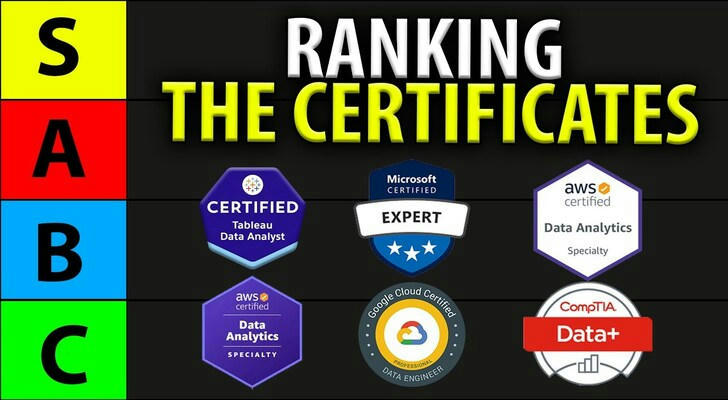The Growing Demand: Why Data Analyst Certification Is More Valuable Than Ever
In today’s world, data is everywhere—on your phone, your social media, your online shopping habits, even your health data from wearable devices. With so much information being generated every second, businesses, governments, and organizations need professionals who can make sense of it all.
This is where you come in! Data analysts are in higher demand than ever before, and earning a data analyst certification could be your ticket to an exciting, rewarding career.

Why Should You Pursue a Data Analyst Certification?
1. Demand for Data Analysts Surges
The demand for skilled data analysts has seen a dramatic rise in recent years. According to a 2023 report by the World Economic Forum, data analysis is one of the top skills employers are seeking. In fact, the Bureau of Labor Statistics (BLS) in the United States predicts a 25% growth in employment for data analysts by 2030, much faster than the average for all occupations.
Many industries are generating vast amounts of data, and companies are realizing the need for professionals to interpret this data and drive business decisions. For example, Amazon and Netflix employ large teams of data analysts to optimize recommendations and improve customer experiences, leading to consistent growth in their business.
2. Job Security in a Recession-Proof Field
Even during economic downturns, data analysts remain in demand. For instance, during the 2020 COVID-19 pandemic, while many sectors experienced layoffs, the tech and analytics industries saw a surge in hiring. Companies like Zoom, Google, and Microsoft ramped up their data analytics teams to meet the growing need for digital transformation.
This trend is expected to continue as businesses increasingly rely on data to make more informed decisions, streamline operations, and predict market trends. During uncertain times, businesses will always need data analysts to stay competitive and agile.
3.A Career Suitable for Ordinary People
One of the standout features of a career as a data analyst is its accessibility—there are no age or gender restrictions, making it an ideal profession for people from diverse backgrounds.
Whether you are a young graduate, someone transitioning from a different career, or even a seasoned professional looking to change fields, data analytics offers an opportunity for all. You don’t need a technical background or prior experience in programming to get started.
Moreover, the career path for data analysts is well-defined, with clear progression from junior to senior positions. As analysts grow in experience, they can also transition into specialized roles, such as Data Engineer, Data Scientist, Business Intelligence Analyst, or Data Architect, which often require additional technical expertise and business acumen.
4. Competitive Salaries and Benefits
Data analysts enjoy some of the most competitive salaries in the job market. According to the US Bureau of Labor Statistics, the median annual wage for data analysts (classified as "operations research analysts") was around $84,810 in 2022, but the salary can range much higher depending on experience, location, and industry.
In the UK, the average salary for a data analyst is between £30,000 - £50,000 annually, with experienced analysts earning more than £60,000. Data analyst roles also come with strong benefits such as remote work options, health insurance, and performance bonuses, especially in top tech companies. Furthermore, as analysts gain more experience and specialize in high-demand fields like machine learning or big data, salaries can increase significantly.
5. Work in Almost Any Industry
One of the most compelling reasons to pursue a data analyst career is the versatility of the role. Data analysts are needed in virtually every industry, from healthcare to finance, e-commerce, government, entertainment, education, and more.
For example, in the healthcare industry, data analysts play a crucial role in improving patient outcomes by analyzing treatment effectiveness and operational efficiencies. Similarly, in the financial sector, they help banks and investment firms analyze market trends, customer data, and risk factors. The growing reliance on data-driven decision-making across all sectors guarantees a broad range of career opportunities.
6. The Canadian Government Provides Corresponding Welfare Policies
The Canadian government has several support programs for workplace training and skills development. For example:
Canada Employment Insurance (EI): This program provides some job training and re-employment services to help job seekers or professionals who are changing careers.
Canada Learning Grant: Some provinces may provide funding for vocational training in specific fields.
How to get a start for becoming a data analyst?
To get started as a data analyst, focus on building a solid foundation of core skills, including proficiency in key tools like Excel, SQL, and programming languages (Python or R), as well as developing strong analytical thinking and data visualization abilities. You better earn a certification in data analysis or related tools can further validate your expertise and make you more marketable to employers.
Consider the following options for your goal:
• Local community colleges often offer Data programs.
• Online platforms provide flexible Analyst training courses.
• On-the-job training programs offered by the government.
Your Path to a Better Future
The world of data analysis is evolving rapidly, and with it comes an exciting opportunity for you to build a rewarding career. Whether you’re looking to earn a competitive salary, enjoy job security, or gain the flexibility to work across industries, a data analyst certification is your gateway to success. With the right certification, you’ll not only be in demand but also equipped with the skills to make a lasting impact in the data-driven world of tomorrow.
Ready to take the leap? Getting certified as a data analyst could be one of the best career decisions you’ll ever make. Start your journey today—because your future in data analysis awaits!
